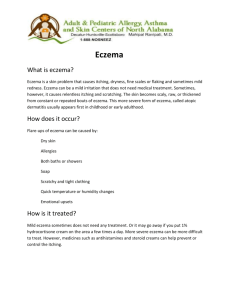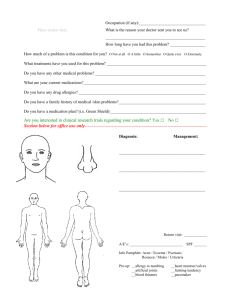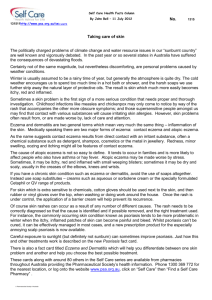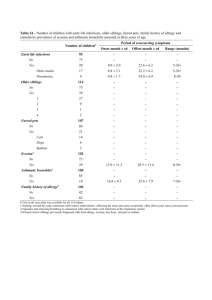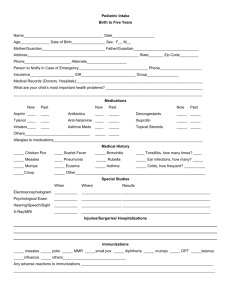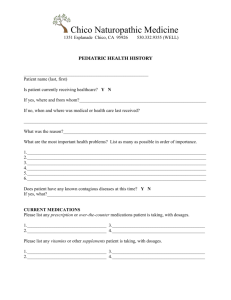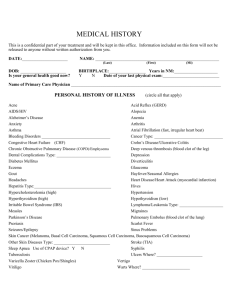Eczema - Oriel Surgery
advertisement
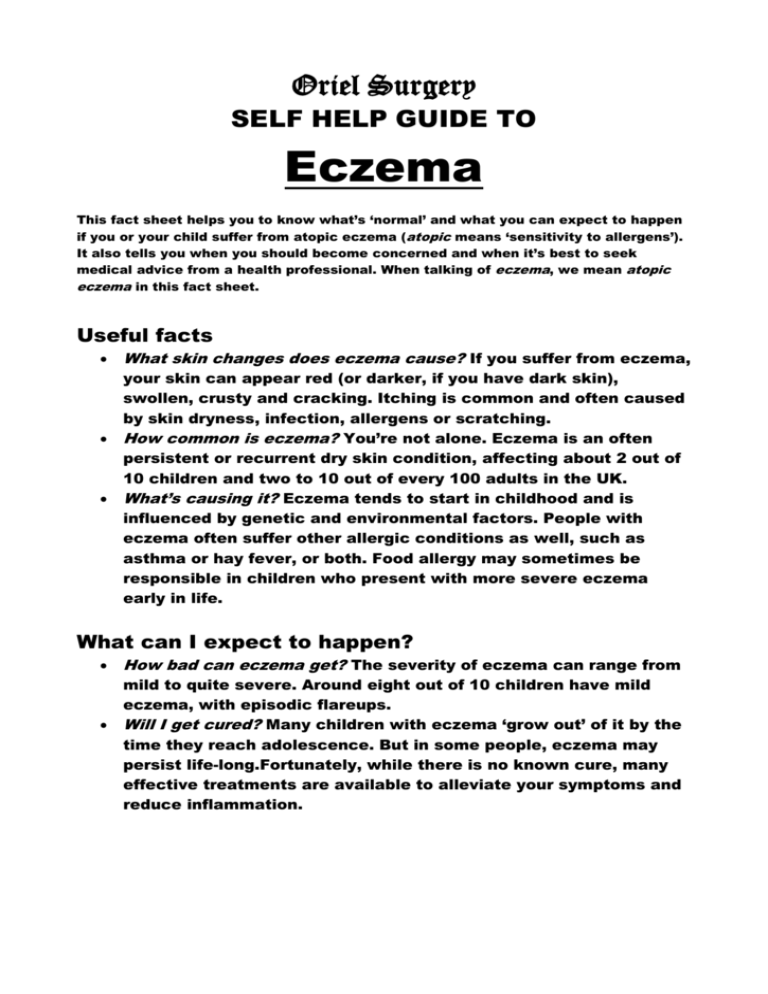
Oriel Surgery SELF HELP GUIDE TO Eczema This fact sheet helps you to know what’s ‘normal’ and what you can expect to happen if you or your child suffer from atopic eczema (atopic means ‘sensitivity to allergens’). It also tells you when you should become concerned and when it’s best to seek medical advice from a health professional. When talking of eczema, we mean atopic eczema in this fact sheet. Useful facts What skin changes does eczema cause? If you suffer from eczema, your skin can appear red (or darker, if you have dark skin), swollen, crusty and cracking. Itching is common and often caused by skin dryness, infection, allergens or scratching. How common is eczema? You’re not alone. Eczema is an often persistent or recurrent dry skin condition, affecting about 2 out of 10 children and two to 10 out of every 100 adults in the UK. What’s causing it? Eczema tends to start in childhood and is influenced by genetic and environmental factors. People with eczema often suffer other allergic conditions as well, such as asthma or hay fever, or both. Food allergy may sometimes be responsible in children who present with more severe eczema early in life. What can I expect to happen? How bad can eczema get? The severity of eczema can range from mild to quite severe. Around eight out of 10 children have mild eczema, with episodic flareups. Will I get cured? Many children with eczema ‘grow out’ of it by the time they reach adolescence. But in some people, eczema may persist life-long.Fortunately, while there is no known cure, many effective treatments are available to alleviate your symptoms and reduce inflammation. What can I do myself to get better – now and in the future? Avoid trigger factors Environmental allergens (such as dust-mite antigens or pollen), irritants (such as detergents or dirt), certain foods, pet dander, smoke, certain weather conditions and stress may all impact on eczema. Try to find out whether any of these impact on your eczema and minimise them. Avoid soap Avoid soap and bubble bath, as both can dry out the skin. Use emollients as soap substitutes. Avoid scratching too hard Scratching is a natural reflex, but scratching too hard can make the itch even worse (the ‘itchscratch cycle’). So whenever possible, avoid scratching your skin too hard with your fingernails – even if it’s tempting. Instead, rub itchy patches gently with your fingertips. Avoid temperature extremes Hot and cold temperatures may also make your eczema worse. So dress appropriately for hot and cold environments, or try to avoid temperature extremes altogether. Use non-irritant garments Synthetic garments and wool can trigger eczema, so you may prefer wearing clothes made out of cotton or other non-irritant materials. Moisturisers Eczema causes the skin to become dry, and the dryer the skin becomes, the higher the chances that your symptoms will get worse. So try to keep your skin as hydrated and smooth as possible by using your moisturising creams or ointments regularly and liberally, even when your skin appears ‘clear’. Inflammation and flare-ups Speak to your pharmacist about how you can step up/down treatments. Antihistamines can help with itching. Detergents Avoid using fabric conditioners and consider adding an extra rinse cycle when using a washing machine. When should I seek medical help? Contact your GP surgery when you feel you need help. Rarely, eczema needs more urgent assessment and treatment, so seek medical advice if you notice any of the following: Reduced quality of life Your skin problems severely affect your sleep or impair social activities such as swimming. Infection Cracking, weeping and painful skin may suggest infection. Blistery rash You develop a painful blistery rash, which may be due to an infection with the herpes simplex virus. Spread Larger areas of your body, such as most of your chest, back, or limbs become dry and/or red. Where can I find out more? There’s a lot you can do to relieve symptoms if your eczema gets worse. Check out NHS Choices (http://www.nhs.uk/Conditions/eczema(atopic)/Pages/Introduction.aspx) and the National Eczema Society website (www.eczema.org) as well as www.nottinghameczema.org.uk for further information on how you can treat and prevent eczema. Remember that your pharmacist can also help you with assessing and treating your symptoms. Or Contact the Surgery on 028 94464936 or visit our website at www.orielsurgery.co.uk for further information.
